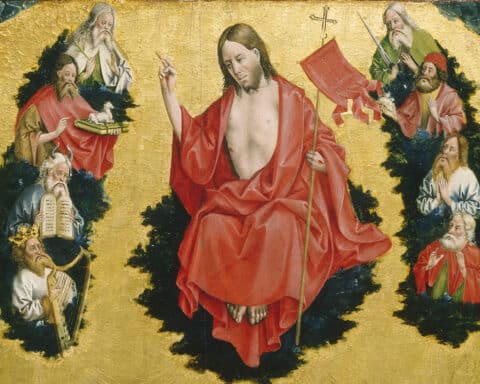
But this act of naming is also quite mysterious — maybe even bewildering at first. What kind of a name is “I am who I am”?
I would like to share my favorite interpretation of this passage, the one that helped me to hear God’s invitation toward merciful love in the mysterious name, “I am.” My favorite interpretation comes from Cardinal Joseph Ratzinger’s “Introduction to Christianity.” There, he spends some pages thinking about the scene of the burning bush and God’s name, “I am.”
| March 20 – Third Sunday of Lent |
|---|
|
Ex 3:1-8, 13-15 |
Let’s remind ourselves of the larger scene first: Israel had been enslaved in Egypt. Life was bitter, and they were cruelly oppressed (cf. Ex 1:11). “The Israelites groaned under their bondage and cried out, and from their bondage their cry for help went up to God” (Ex 2:23). Thus, we come to this scene aware of God as a God who hears us in our sufferings and who responds: “I know well what they are suffering. Therefore I have come down to rescue them” (Ex 3:7-8). Rabbinic interpretations of this passage emphasize the merciful character of God’s response by describing the burning bush as a thornbush.
Confronted by the wonders of a burning “thornbush,” Moses is struck with fear, and he hides his face, afraid to look upon God. Perhaps Moses also fears the mighty task he is being given: to free the Israelites from their slavery. And so he says to God, “If I go to the Israelites and say to them, ‘The God of your ancestors has sent me to you,’ and they ask me, ‘What is his name?’ what do I tell them?”
Cardinal Ratzinger (later Pope Emeritus Benedict XVI) reminds us that God’s response has two parts. First, he gives his name, “I am who I am.” Second, because this name is hardly a name, God gives further identification: “Thus shall you say to the Israelites: The Lord, the God of your fathers, the God of Abraham, the God of Isaac, the God of Jacob” (Ex 3:6). As Cardinal Ratzinger writes, God identifies himself as the God of a people. This identifier, “of a people,” is in contrast to the many gods of the surrounding nations, including Egypt, who are gods of places rather than of people. Israel’s God, our God, is a God who desires that we call out to him, for he desires to be with us, even to be tabernacled among us (cf. Ex 40:34-38, Jn 1:14), and even in a “thornbush.”
What about God’s actual name, then? Cardinal Ratzinger gives us several ways to understand this name, which at first seems like a rebuff: “What is your name?” “I am who I am!” Far from a rebuff, this name is an invitation to life with God. It is the merciful naming that allows Israel to call upon God with the particular confidence that he will hear their sufferings. “I am who I am” is a name that truly means, “I am being itself,” and so “I am here always” or “I endure.” And thus, Cardinal Ratzinger concludes, it is a name that identifies God by his mercy: because “I endure” and am “of people,” “I am there for you.”
Thus, this name also identifies God’s desire for us. It is compassionate, steadfast, loving. In a word: merciful. To call upon this name, as Israel learned to do, is to respond to God’s invitation to know him through his merciful love, and to burn with this same merciful love. Confronted by the wonders of the burning bush, we are invited to call upon the God who not only “is,” but who is present in our sufferings.
Catherine Cavadini, Ph.D., is the assistant chair of the Department of Theology and director of the master’s in theology program at the University of Notre Dame.





